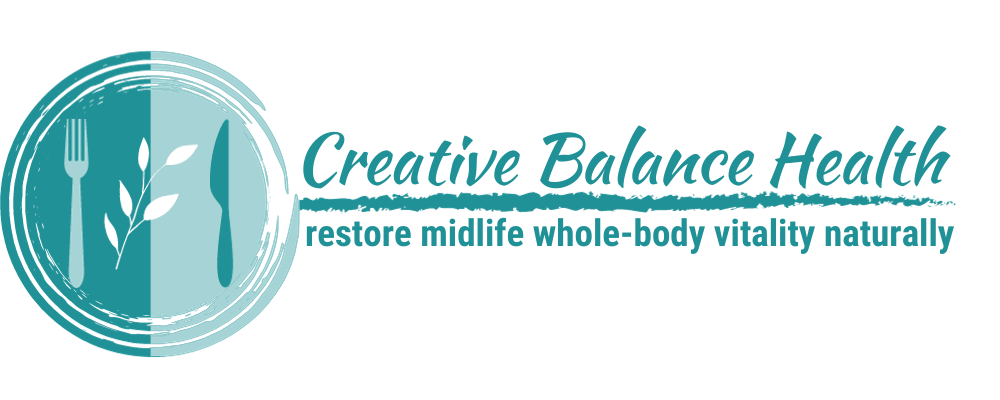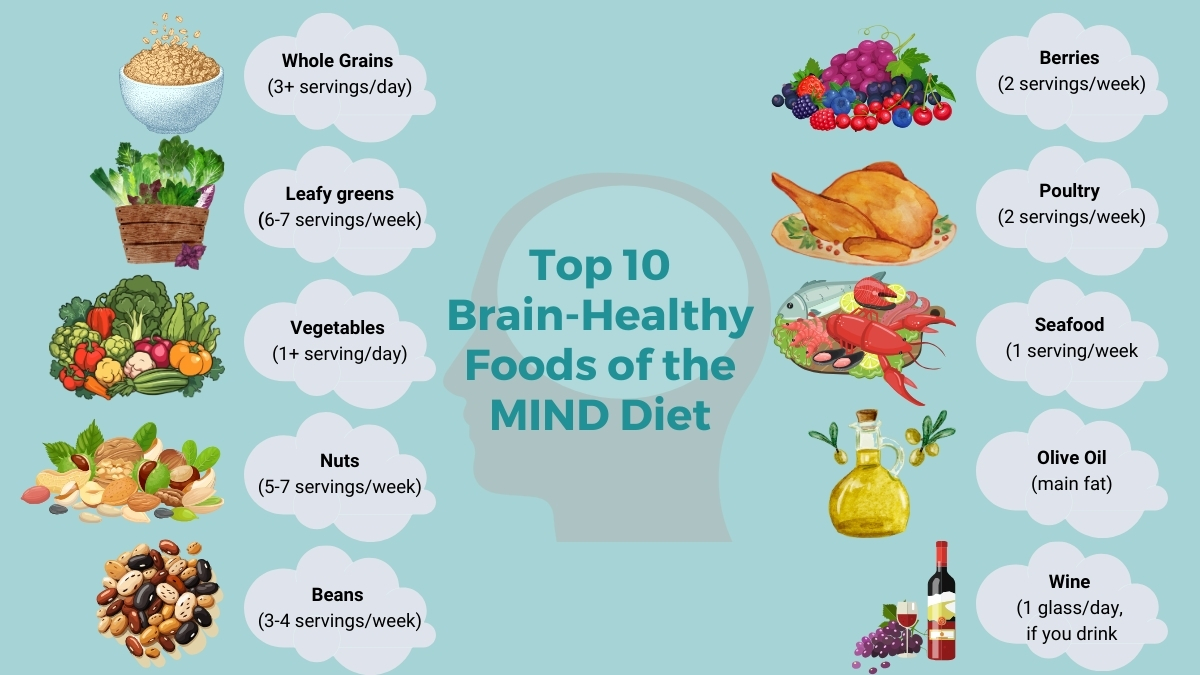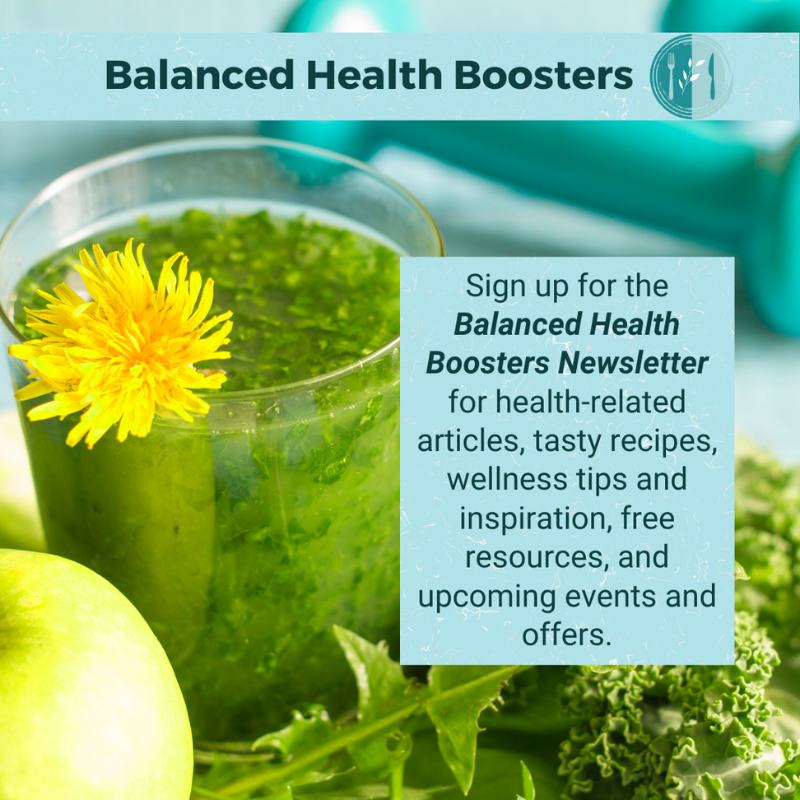We’ve all been there—blanking on a name or word and thinking, “Is this just brain fog, or am I getting Alzheimer’s?” It’s that little panic we’ve all felt, especially with a family history.
After turning 60, I knew it was time to look closer at my brain health. Alzheimer’s disease runs in my family—both my dad and grandmother had it. So, last summer, I took a special Vibrant Wellness NeuralZoomer Plus test to see how my brain was doing. The results showed that I have a 47% chance of developing Alzheimer’s by the time I’m 76. That number sounds scary, but it’s not the whole story. I can lower that risk by eating a healthy diet like the MIND diet and making smart choices about sleep, exercise, and stress.
What is the MIND Diet?
If you want to stay sharp and keep your memory strong as you get older, the MIND diet might be just what you need.
The MIND diet is a combination of two other healthy diets: the Mediterranean diet and the DASH diet (which stands for Dietary Approaches to Stop Hypertension). Scientists have found that people who follow the MIND diet are better at thinking, solving problems, and remembering things as they age. This means the MIND diet can help keep your brain healthy.
A study published in the Journal of Alzheimer’s Disease found that the MIND diet could even slow down the progress of Alzheimer’s if it starts in the brain. The study began in 1997 with 569 older adults who didn’t have any signs of dementia. Every year, these people had tests to check their memory and thinking skills. The researchers also asked about what they ate and gave their diets a score based on how close they were to the MIND diet. After these people passed away, scientists looked at their brains to see if there were signs of Alzheimer’s.
Here’s the amazing part: even if someone’s brain had the signs of Alzheimer’s, like plaques and tangles, if they had followed the MIND diet, they didn’t show symptoms of Alzheimer’s during their life. This means the MIND diet might help protect the brain, even when Alzheimer’s changes are already happening inside.
So, what does the MIND diet include? It has 10 “brain-healthy” food groups:
- Whole grains (at least 3 servings per day)
- Green leafy vegetables (at least 6-7 servings per week)
- Other vegetables (at least 1 serving per day)
- Nuts (5-7 servings per week)
- Beans (3-4 servings per week)
- Berries (2 servings per week)
- Poultry (2 servings per week)
- Seafood (1 serving per week)
- Olive oil (use as your main fat)
- Wine (1 glass per day if you drink alcohol)
The diet also recommends limiting 5 “not-so-brain-healthy” food groups:
- Butter and margarine (less than 1.5-3 teaspoons per day)
- Red meat (less than 4 servings per week)
- Whole-fat cheese (less than 1 serving per week)
- Pastries and sweets (less than 1 serving per week)
- Fried or fast food (less than 1 serving per week)
How the MIND Diet Can Help
Because I have a higher risk of Alzheimer’s, the MIND diet is a big part of how I’m taking care of my brain. The foods in the MIND diet are packed with nutrients that help protect the brain from damage. They have antioxidants, which help fight off things that can hurt your brain, and anti-inflammatory compounds, which keep the brain from swelling or getting hurt. Plus, the MIND diet helps keep the protective covering on your nerve cells healthy, which is important for someone like me with certain markers in my blood that could lead to nerve damage.
But it’s not just about what you eat. Getting enough sleep, staying active, and managing stress are all important, too. Even though my test results showed I have a 47% risk of Alzheimer’s, I know that by following the MIND diet and taking care of my health in other ways, I can lower that risk a lot.
If you’re interested in how reducing inflammation can also support your brain health, you might want to check out my posts on Stopping “Inflammaging” in its Tracks and Ways to Stay Healthy Over 50.
What is the Vibrant Wellness NeuralZoomer Plus Test?
The Vibrant Wellness NeuralZoomer Plus test is a simple blood test that looks for signs that your brain might be at risk for problems like Alzheimer’s. It checks for specific markers that could show if your brain is getting hurt or if you might have memory issues later on. If the test finds these markers early, you can start making changes to protect your brain health.
Taking Action: How the MIND Diet Fits Into a Healthy Lifestyle
For me, the MIND diet is one of the best ways to keep my brain healthy. But I also know that what I eat is just one part of the puzzle. I also focus on getting enough sleep, exercising regularly, and finding ways to manage stress. These things work together to help keep my brain sharp and lower my risk of Alzheimer’s.
Check out more lifestyle tips here: 6 Ways to Eliminate Brain Fog and Achieve Mental Clarity
If you’re in your 50s or 60s and worried about memory loss or cognitive decline, now is a great time to start making changes. The MIND diet is an easy and tasty way to help protect your brain. And when you combine it with other healthy habits, you’re giving yourself the best chance to stay sharp as you age.
If you’re interested in finding out more about your brain health, I can help you get the NeuralZoomer Plus test. I’ll also help you understand the results and give you personalized recommendations to improve your brain health.
How to Eat More “Brain-Healthy” Foods
Here are some simple, delicious ways to start eating the MIND diet:
- Overnight Oats with Fresh Berries: A tasty, brain-boosting breakfast.
- Herbed Quinoa Salad: Enjoy a daily salad with leafy greens and other vegetables.
- Chickpea Summer Veggie Tagine: A filling, meatless meal that’s great for your brain.
- Swiss Chard and Quinoa Vegetable Wraps: One of my favorite brain-healthy recipes.
- Snack on Some Nuts or Berries When You’re Hungry: Healthy snacks that keep your brain fueled.
- More Snack Ideas: Why Snacking Isn’t the Enemy: More ways to enjoy brain-boosting snacks.
- Swap Out White or Processed Grains for Whole Grains: Choose brown or wild rice, buckwheat, teff, millet, and other whole grains to keep your brain strong.
- Ditch Your Butter, Margarine, or Other Oil for Olive Oil: Olive oil is a brain-healthy choice.
Taking these steps now will help protect your brain as you get older, giving you the best chance to stay sharp and enjoy life. If you need more tips or personalized advice, feel free to reach out.
P.S. Want to learn more about your own brain health? Contact me today to find out how the NeuralZoomer Plus test could help you take charge of your brain health.
Reference:
Dhana, K., James, B. D., Agarwal, P., Aggarwal, N. T., Cherian, L. J., Leurgans, S. E., Barnes, L. L., Bennett, D. A., & Schneider, J. A. (2021). MIND Diet, Common Brain Pathologies, and Cognition in Community-Dwelling Older Adults. Journal of Alzheimer’s disease: JAD, 83(2), 683–692. https://doi.org/10.3233/JAD-210107
https://www.ncbi.nlm.nih.gov/pmc/articles/PMC8480203/
Backgrounder articles:
- https://medicalxpress.com/news/2021-09-mind-diet-linked-cognitive.html
- https://www.inverse.com/mind-body/mind-diet-brain-health
- Rush University Medical Center. (2021, September 21). MIND diet linked to better cognitive performance: Study finds diet may contribute to cognitive resilience in the elderly. ScienceDaily. Retrieved November 11, 2021 from www.sciencedaily.com/releases/2021/09/210921172721.htm
- https://en.wikipedia.org/wiki/Cognition
- https://www.nia.nih.gov/health/what-do-we-know-about-diet-and-prevention-alzheimers-disease
- https://www.heartandstroke.ca/articles/eat-to-protect-your-brain






